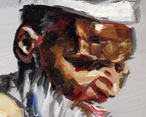Xenophilia
In praise of human variety

Minorities are the ornaments of the human world. So I feel, but of course it's only my aesthetic feeling. The study of human life-ways is called anthropology, and anthropologists are sometimes severe about those who merely collect cultural curiosities, like baubles for a shelf in a museum. Each culture should be studied as a functioning whole. Well, that is correct, as far as science goes. A healthy culture is indeed an interlocking system, where for instance witchcraft is not just something stuck on, but may have the function that police have in another society; or where people do not call their mothers' brothers by a special term just to puzzle us, but because it is part of a system for inheriting and sharing goods. To admire a society as deeply as it deserves we need to know all this and much more—as much as takes a lifetime. Still, I don't think it's wrong to say to a friend: "The Yiddish culture of eastern Europe was wonderful" or "There are many different and interesting cultures in New Guinea." So it is not wrong to expand this into appreciative descriptions of some of these cultures. It is no more wrong than it is to write a poem on some subject instead of, or in parallel to, a strictly scientific treatise on it. My shelf of baubles aims only to spread a little appreciation. It is frankly romantic. There is far more to be said about each culture, indeed there is an infinity. One part I wonder whether to leave out is the end: the downside, the destructive treatment of all too many of these peoples by a dominant culture, which is all too often our own. I understate it. My idea was to make you smile at things beautiful, and I wish the smile did not have to end in sadness and anger. Vive la Différence! (Anon.) Sevistirilemediklerinden. (Max Müller.) Sweet are the uses of diversity. (With apologies to Shakespeare's As You Like It.) The minority is always beautiful. It is customary to start a speech with a joke and a book with a quote. "Vive la différence!" is a well known exclamation, of authorship unknown (at any rate to me). It might look better at the front of a treatise on sexuality, since it expresses the delight of men in women and vice versa. But it can express more: our delight that there are seasons, so that the spring feels sweet after the winter; that the universe happens to be not just black-and-white, but colored; that the flat rich ground of a field can cut into the steep rocky or wooded side of a hill; that people do the odd things that give us stories to tell. It could have wider application still, reminding us that diversity is not just beautiful but useful. Through diversity creatures evolve, and so do cultures and ideas. What about "Sevistirilemediklerinden"? This is a Turkish word. In Turkish you can make up words just about as long as you like, and be understood, whether or not they happen to have been spoken before. There was a German scholar, Max Müller, who remarked that the cause of the Crimean War could be expressed in this single (though medium-long) Turkish word: it means "Because of their not having been able to be made mutually to love one another". Max Müller meant by this to illustrate the delightful nature of the Turkish language, which is what is called "agglutinating": the root sev- means "love" and all the rest of the syllables are meaningful elements that in English would be separate words—for instance the syllable -me- carries the negative meaning, and -ler- the plural meaning. Also, Turkish has a famous feature called "vowel harmony". Because the vowel in the first syllable is e, the vowels in the rest of the syllables are bright, fluting i's and e's; if the first syllable had had an a or an o, the other syllables would have had dark vowels such as a, o, u... But while it is true that agglutination, vowel-harmony, and many other peculiarities of Turkish are fascinating, it is also true that if the Turks and the Russians could have been made mutually to love one another, the Crimean War would have ground to a halt. Like Vive la différence!, Sevistirilemediklerinden can be broadened: it is a truth of wider application than the Turks and the Russians. It is so wide and clear that it is a "truism", which seems to mean a truth so obvious that we ignore it. If for instance the people of mediaeval Europe had continued to marvel at the existence among them of strangers with mysterious origins and wonderful skills, and had not lapsed into fearing them, then there would have been no pogroms against Jews and Gypsies. Or if those people who speak the Serbocroat language and have grown up in the Orthodox Christian tradition could be made to love the fact that sharing their land and language are other people who have grown up in the Catholic and Muslim traditions, then there would have been no "ethnic cleansing" in the towns and villages of Bosnia. And if we could enjoy the contemplation of communities among us who (say) have richly colored skin, or go breakdancing, or speak Spanish, or worship Ras Tafari, we (as well as they) would be happier. |